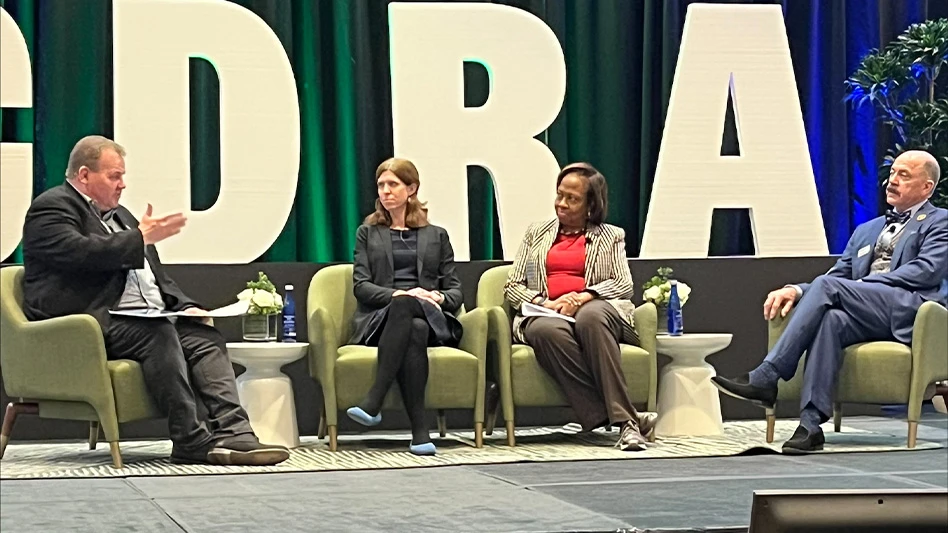
Recycling Today archives
A new report prepared by five staff members of global consulting firm McKinsey & Co. predicts that in the coming years, demand growth for low-carbon, circular materials is expected to outstrip additions to supply capacity.
Much of the report focuses on metals, including steel, aluminum, copper, battery metals and precious metals, though the production and carbon intensity of plastics, glass and cement also are addressed.
The report includes a half dozen charts comparing the greenhouse gas (GHG) emissions aspects tied to the production of the materials covered as well the availability of recycled materials and how the use of scrap affects emissions levels.
The report, titled “Looking upstream: A path to unlocking low-carbon, circular materials,” was prepared by Karel Eloot of McKinsey’s Shenzhen, China, office; Michel Van Hoey from the firm’s Luxembourg office; Peter Spiller and Vladislav Vasilenko from McKinsey’s Frankfurt, Germany, office; and Sebastian Göke, who is based in Berlin with McKinsey.
Although McKinsey foresees strong demand for recycled-content materials, the report says, “There is additional uncertainty related to how green premiums could evolve in the face of already-rising materials costs, requiring companies to act to secure supply."
According to the report, which is part of a series being produced by the consultancy, “The slow maturation of a premium market could be a bottleneck for broader development.”
In a chart portraying forecasted global supply and demand for recycled materials, McKinsey predicts low-carbon or recycled-content copper will experience an overall tight market between 2025 and 2035, potentially experiencing a 3 million-metric-tons-per-year supply deficit.
Despite statistics indicating most discarded plastic goes unrecycled, McKinsey refers to a structural supply problem in the recycled-content plastics sector that could cause a 2 million-metric-ton-per-year supply deficit over the next decade.
The consulting firm sees the same structural problem occurring in the flat-rolled steel sector, while it predicts the aluminum sector will come the closest to meeting low-carbon or secondary ingot demand by 2035.
“Circularity has the potential to address emissions across industries and value chains," the report says. "However, to increase recycled content in their products, companies need a detailed understanding of current barriers and [solutions].
“One important area of focus could be tapping new secondary pools instead of competing for already-scarce existing supplies of secondary materials.”
The report examines the difference between preconsumer and postconsumer scrap, stating that companies interested in securing additional volumes must think through how to tap new secondary pools, such as those from end-of-life products, or postconsumer scrap, or use existing pools more effectively.
It sees one opportunity in techniques currently being explored by metals recyclers and technology providers in terms of overcoming traditional barriers that have made it difficult to recover and preserve specific alloys and limiting the recycling of mixed scrap to cast alloys.
McKinsey also sees the waste, electrical and electronic equipment (WEEE) materials stream as one where companies could tap additional volumes through partnerships and build specific e-scrap recycling channels and infrastructure.
"Successful stakeholders in the recycling value chain will need to identify the major cost drivers in their respective ecosystems (for example, collection, dismantling, sorting or processing) and how they can effectively be mitigated through, among other factors, technological development, scale, low-cost logistics networks and partnerships to make a favorable business case for the use of new pools of secondary materials," the report says.
The full report can be viewed on the McKinsey website.
Latest from Recycling Today
- BlueScope’s new CEO affirms bid rejection
- US steel imports finish 2025 down 12 percent
- Cascades sells corrugating plant to Crown Paper
- You have production scrap, WEIMA machinery processes it where it’s made
- CP Group, Cisek Inspections forge innovative X‑ray recycling alliance
- Regroup, CP Group unite for cutting-edge Halifax MRF
- Modern MRFs: AI, automation and safety, redefining recycling operations
- CalRecycle opens comment period on proposed SB 54 revisions





